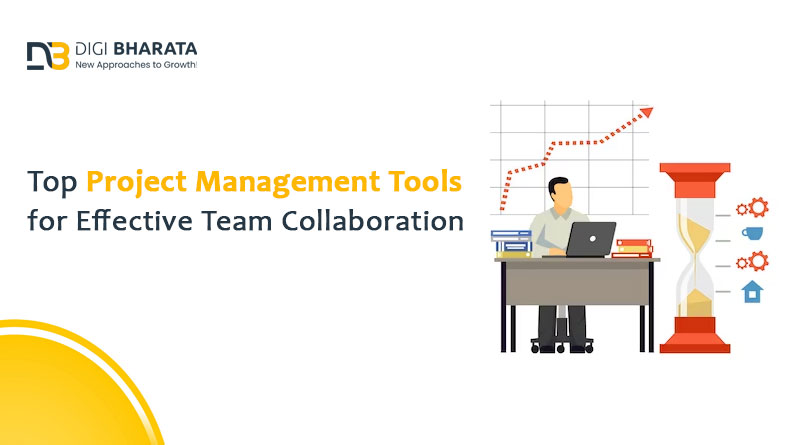As businesses continue to grow, the importance of project management cannot be overstated. Proper project management helps to ensure that projects are completed efficiently, within budget, and on time. The use of project management tools is one of the most effective ways to achieve this goal.
Also Check: Best Workforce Management Tools
In this blog, we will explore the top project management tools that you can use to streamline your project management process.
Table of Contents
Features of Project Management Tools
Project management tools come with a variety of features that can help businesses to manage their projects more efficiently. Below are some of the most common features of project management tools:
- Task management – This feature allows users to create, assign, and track tasks within a project. It also enables users to set deadlines, create dependencies, and assign priorities to tasks.
- Project planning – This feature allows users to create project plans, set milestones, and allocate resources. It also enables users to create Gantt charts to visualize project timelines.
- Time tracking – This feature allows users to track the time spent on tasks and projects. It also enables users to monitor billable hours and track the progress of the project.
- Collaboration – This feature allows users to collaborate with team members, clients, and stakeholders. It also enables users to share files, communicate in real time, and provide feedback.
- Budget tracking – This feature allows users to track project expenses and manage budgets. It also enables users to monitor costs, track invoices, and create reports.
- Resource management – This feature allows users to manage project resources, including people, equipment, and materials. It also enables users to allocate resources and track resource utilization.
- Reporting – This feature allows users to create reports that provide insights into project performance. It also enables users to monitor project metrics and identify areas for improvement.
- Integrations – Many project management tools offer integrations with other tools, such as calendars, email, and messaging apps. This feature allows users to streamline their workflow and increase productivity.
List of Project Management Tools
Trello
Trello is a popular project management tool that offers a visual approach to managing projects. It uses a card-based system to represent tasks, which can be organized into lists and boards. You can easily drag and drop cards between lists to reflect the current status of each task. Trello also offers a variety of integrations with other tools like Slack, Google Drive, and Dropbox.
| Offers a simple and intuitive interface | Has limited customization options |
| It offers a range of features | Limited reporting features |
| Offers integrations with other tools | Limited project management capabilities for larger teams |
Asana
Asana is a comprehensive project management tool that offers a range of features to help you manage your projects. It offers a simple and intuitive interface, making it easy for users to collaborate on tasks and projects.
Also Check: Best IT Asset Management Software
You can also use Asana to track your team’s progress, set priorities, and schedule deadlines.
| Pros | Cons |
|---|---|
| Offers a range of features | Limited customization options |
| Easy to use | Can be overwhelming for small teams |
| Offers integrations with other tools | Expensive for larger teams |
Jira
Jira is a powerful project management tool that is widely used in software development. It offers a range of features that make it easy to manage tasks, track progress, and collaborate with team members. Jira offers integrations with a variety of other tools like GitHub, Bitbucket, and Confluence.
| Pros | Cons |
|---|---|
| Offers a range of features | Steep learning curve |
| Customizable interface | Expensive for larger teams |
| Offers integrations with other tools | Limited reporting features |
Monday.com
Monday.com is a cloud-based project management tool that offers a range of features to help you manage your projects. It offers a simple and intuitive interface, making it easy for users to collaborate on tasks and projects. You can also use Monday.com to track your team’s progress, set priorities, and schedule deadlines.
| Pros | Cons |
|---|---|
| Offers a range of features | Expensive compared to other tools |
| Customizable interface | Limited task management features |
| Offers integrations with other tools | Steep learning curve |
Basecamp
Basecamp is a project management tool that offers a range of features to help you manage your projects. It offers a simple and intuitive interface, making it easy for users to collaborate on tasks and projects. You can also use Basecamp to track your team’s progress, set priorities, and schedule deadlines. Basecamp also offers a messaging system that allows users to communicate in real time.
| Pros | Cons |
|---|---|
| Offers a simple and intuitive interface | Has limited customization options |
| It offers a range of features | Limited project management capabilities for larger teams |
| Offers integrations with other tools | Limited reporting features |
Wrike
Wrike is a comprehensive project management tool that offers a range of features to help you manage your projects. It offers a simple and intuitive interface, making it easy for users to collaborate on tasks and projects. You can also use Wrike to track your team’s progress, set priorities, and schedule deadlines. Wrike also offers a variety of integrations with other tools like Salesforce, Zapier, and Slack.
| Pros | Cons |
|---|---|
| Offers a range of features | Can be overwhelming for small teams |
| Customizable interface | Steep learning curve |
| Offers integrations with other tools | Expensive for larger teams |
Smartsheet
Smartsheet is a cloud-based project management tool that offers a range of features to help you manage your projects. It offers a simple and intuitive interface, making it easy for users to collaborate on tasks and projects. You can also use Smartsheet to track your team’s progress, set priorities, and schedule deadlines.
| Pros | Cons |
|---|---|
| Offers a range of features | Can be overwhelming for small teams |
| Customizable interface | Limited reporting features |
| Offers integrations with other tools | Expensive for larger teams |
Microsoft Project
Microsoft Project is a comprehensive project management tool that offers a range of features to help you manage your projects. It offers a simple and intuitive interface, making it easy for users to collaborate on tasks and projects. You can also use Microsoft Project to track your team’s progress, set priorities, and schedule deadlines.
| Pros | Cons |
|---|---|
| Offers a range of features | Steep learning curve |
| Customizable interface | Expensive for larger teams |
| Offers integrations with other tools | Limited collaboration features |
Teamwork
Teamwork is a project management tool that offers a range of features to help you manage your projects. It offers a simple and intuitive interface, making it easy for users to collaborate on tasks and projects. You can also use Teamwork to track your team’s progress, set priorities, and schedule deadlines.
Also Check: Find The Best CRM Software
Teamwork also offers integrations with a variety of other tools like Hubspot, Trello, and Dropbox.
| Pros | Cons |
|---|---|
| Offers a range of features | Can be overwhelming for small teams |
| Customizable interface | Limited reporting features |
| Offers integrations with other tools | Expensive for larger teams |
Airtable
Airtable is a cloud-based project management tool that offers a range of features to help you manage your projects. It offers a simple and intuitive interface, making it easy for users to collaborate on tasks and projects. You can also use Airtable to track your team’s progress, set priorities, and schedule deadlines. Airtable also offers a variety of integrations with other tools like Zapier, Slack, and Google Drive. Additionally, Airtable allows for the creation of custom fields and templates, making it a versatile tool for project management.
| Pros | Cons |
|---|---|
| Offers a range of features | Limited project management capabilities for larger teams |
| Customizable interface | Limited reporting features |
| Offers integrations with other tools | Can be overwhelming for small teams |
Benefits of Using Project Management Tools
There are many reasons why using project management tools can be beneficial for individuals and teams. Find below the main advantages:
- Improved Organization: Project management tools help teams stay organized by providing a centralized location for all project-related information. This can include task lists, timelines, project schedules, and more.
- Enhanced Collaboration: Project management tools provide a platform for team members to collaborate and communicate effectively. Team members can share information, assign tasks, and update project statuses in real time.
- Increased Efficiency: By streamlining workflows and automating repetitive tasks, project management tools can help teams work more efficiently. This can result in faster project completion times and increased productivity.
- Better Communication: Project management tools help facilitate better communication between team members and stakeholders. This can help ensure that everyone is on the same page and that project objectives are being met.
- Improved Accountability: Project management tools help hold team members accountable for their tasks and deadlines.
- Better Decision Making: Project management tools provide teams with access to real-time data and insights, enabling them to make more informed decisions about project direction and resource allocation.
Conclusion
Project management tools are a valuable resource for teams of all sizes and industries. With so many options available, it’s important to evaluate different project management tools based on their features, user interface, pricing, integrations, support, and security.
By selecting the right tool for your team’s needs, you can streamline your project management workflows, increase productivity, and achieve better project outcomes.






















+ There are no comments
Add yours